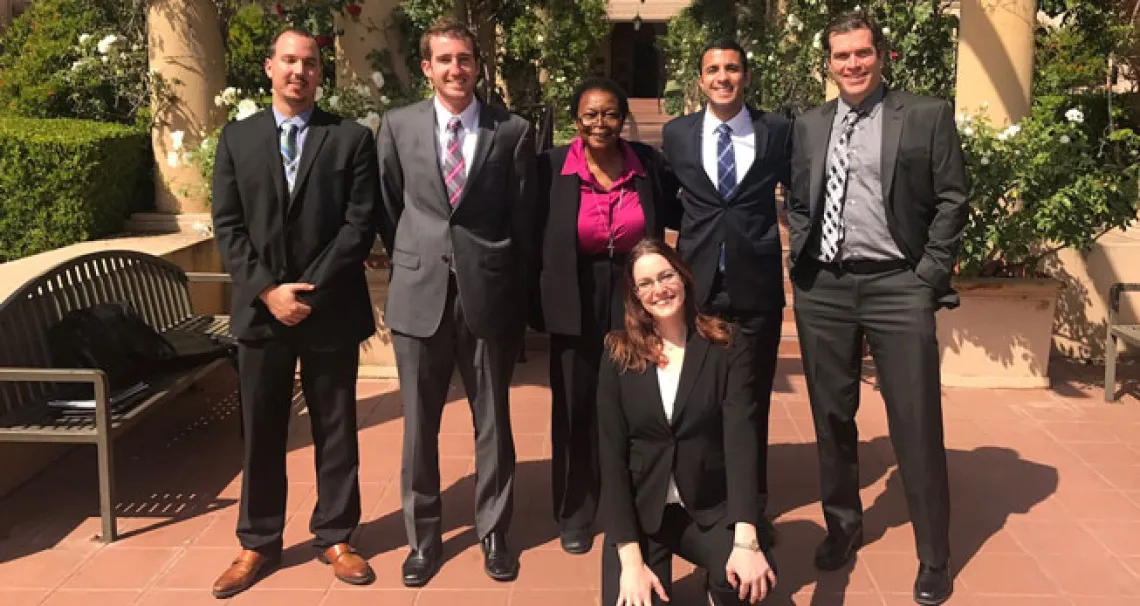University of Arizona Law Students Win Case in Federal Appeals Court

The stakes were high, but the students from University of Arizona Law’s 9th Circuit Appellate Representation Clinic were ready and in the end, came away with an impressive victory.
Each year, the 9th U.S. Circuit Court of Appeals offers a handful of pro bono cases to students at law schools in its jurisdiction. They are time-intensive cases requiring months of hard work, but the experience is invaluable—investigating a case, filing briefs and arguing before federal judges.
Seeing a case completely through in the 9th Circuit usually takes years, but cases staffed by clinic students are all scheduled to conclude in one academic year, without exceptions or extensions.
A few weeks into the start of their 3L year, Ashley St. Clair, Nick Alsaka, Joseph Radochonski and Matthew Hoxsie began work representing the plaintiff in Lolita Schagene vs. Raymond Mabus, Jr, et al. Fellow 3L Slade Smith joined the team a few months later. Their client, Lolita Schagene, had lost a Title VII sex discrimination/sex harassment/hostile work environment claim against her employer, a San Diego RV marina operated by the U.S. Navy. The students worked under the supervision of clinic director and Assistant Dean of Student Affairs Willie Jordan-Curtis.
“Our job was to find all the appealable issues,” says team-lead St. Clair. “You’re going through every deposition, every trial transcript, Equal Employment Opportunity Commission investigation pages, hundreds of pages and months of work. From there it was just meeting after meeting after meeting: researching, writing, and presenting our issues, whatever we needed to be the best advocates for Lolita Schagene.”
Most importantly, they believed that the Navy’s heavy focus on their client’s remote and highly sensitive medical diagnoses had been mistakenly allowed in the original trial.
In addition to research and writing for the appeal (and of course managing work for their other classes), the team had to learn the rules and procedures the 9th Circuit follows.
“They are very particular about how briefs are formatted—footnotes, citations, how it’s bound,” St. Clair explains. “Our opening brief was actually originally kicked back because we didn’t get it quite right.”
"It's not a student thing—it's real"
After the students successfully filed their opening brief in late October, the Navy followed with an answering brief 60 days later. The Arizona Law team then submitted a reply brief 60 days after that, and oral arguments were set for April 3.
“It’s not a student thing—it’s real,” St. Clair says. “We went up against Navy lawyers, the same lawyers who argued the case in trial.”
To prepare for oral arguments, the students spent long hours practicing their remarks and receiving critique from each other, Jordan-Curtis and Director of Clinics Paul Bennett.
The hearing took place at the 9th Circuit’s Pasadena, California courthouse, where the team presented their prepared arguments while also responding to questions interjected by the three-judge panel.
When it was over, they felt proud of their work, although didn’t know what decision to expect or even when it would be rendered. But after giving so much to the case, even just being in a 9th Circuit court was satisfying on its own.
“It was really exhilarating in front of those judges,” St. Clair says. “Most lawyers never get a chance to go to the 9th Circuit. It’s really a privilege and a pleasure to go there.”
The next month they graduated and then began studying for the bar exam. Finally, on Aug. 22, the court’s decision was rendered: reversed and remanded back to the district court.
As team lead, St. Clair got to call the client to deliver the good news. “She didn’t believe me at first, but she was thrilled,” St. Clair says.
The work does not stop just because they graduated. The team is helping their client find new pro bono representation in San Diego.
St. Clair now returns to her hometown of Las Vegas to work in the consumer rights division of the Legal Aid Center of Southern Nevada. She says the clinic experience taught her volumes of practical skills, from client contact to teamwork to time management. Not to mention the benefits of the mentorship provided by Jordan-Curtis.
In the end, the students gained exceptional experience while achieving justice for their client.
Says St. Clair, “It’s extremely challenging, but very rewarding.”
